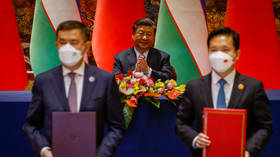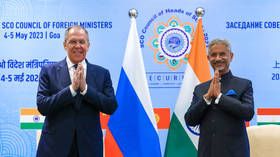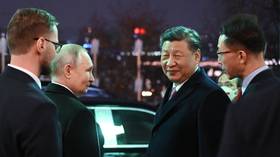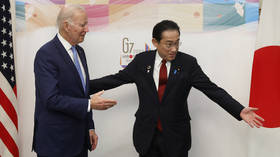Are China and Russia competing in Central Asia? A view from Beijing

Chaired by President Xi Jinping, the China-Central Asia Summit invites the leaders of Kazakhstan, Kyrgyzstan, Tajikistan, Turkmenistan, and Uzbekistan to gather and attend the meeting in the historic city of Xi'an, China on 18 and 19 May.
As the first major diplomatic event hosted by China this year, and the first in-person summit between China and the five Central Asian nations since the establishment of diplomatic relations over three decades ago, the significance of this summit cannot be overstated.
The summit holds the promise of ushering in a new era of China-Central Asia relations and fostering enhanced stability and development prospects in the region, and it is unfortunate that certain media outlets have chosen to persist with the narrative of China-Russia competition in Central Asia.
With the tumultuous withdrawal of the United States from Afghanistan and the ongoing Russia-Ukraine crisis, coupled with Western powers lagging in their economic and strategic engagement in Central Asia, it is undeniable that China has emerged as a more significant player in the region. However, does China's growing presence in Central Asia pose a threat to the interests of any power, including Russia?
The answer is no. Such a claim not only dismisses the diplomatic wisdom of Central Asian countries, but also shows a misunderstanding of the very essence of China’s foreign policy towards both Central Asian countries and Russia. Moreover, it seeks to sow discord and strain in the amicable relations between China, the Central Asian countries, and Russia.
The five Central Asian countries are independent and sovereign nations, entitled to engage and reach cooperation agreements with any party that can bring concrete benefits.
In a recent interview with CGTN, President of Kazakhstan Kassym-Jomart Tokayev was asked about the concerns raised by some observers over China's increasing involvement in Central Asia and its potential impact on the geopolitical balance. In his response, Tokayev emphasized that “there should be no suspicions” in this regard. He said that the intentions of China and Central Asian countries are “open and sincere.” He further pointed out that China has already emerged as the world's second-largest economy with a substantial economic magnitude, and therefore it’s imperative to recognize China's significant position and foster positive relations with the country.
Moreover, in a joint statement issued by the leaders of China and five Central Asian states on the occasion of the 30th anniversary of their diplomatic ties last year, the six nations emphasized the establishment of a model for international relations based on mutual respect, fairness, justice, and win-win cooperation.
The statement highlighted several key points. Firstly, the six nations firmly support each other on matters of vital national interest, including independence, sovereignty, and territorial integrity. Meanwhile, China and the Central Asian countries have successfully resolved historical border issues through peaceful negotiations. Their efforts have transformed the shared border of over 3,300 kilometers into a friendly and cooperative boundary, serving as a positive example for peaceful resolution of territorial disputes among nations.
Secondly, trade and investment between China and the Central Asian countries have experienced rapid and steady growth, injecting a strong impetus into the economic and social development of all six nations. China is the largest trading and investment partner of the five Central Asian countries, with trade reaching a record high of $70.2 billion US dollars in 2022, compared to $460 million in 1992 when diplomatic relations were established. By the end of 2022, China's direct investment in Central Asia had exceeded $15 billion.
In addition, all parties actively promote the alignment of the Belt and Road Initiative (BRI) with their national development strategies. Notably, they have completed numerous mutually beneficial projects, such as the China-Kazakhstan oil pipeline, China-Central Asia natural gas pipeline, China-Kyrgyzstan-Uzbekistan highway, China-Uzbekistan Pengsheng Industrial Park, and China-Tajikistan-Uzbekistan highway. These projects have greatly benefited the people of the region.
Lastly, China and the five Central Asian countries have effectively collaborated in combating the "three evil forces" – violent terrorism, ethnic separatism, and religious extremism. Their joint efforts include opposing external interference and collectively safeguarding regional peace and stability.
Those achievements underscore the positive and fruitful relationship between China and Central Asian nations, showcasing their shared commitment to building a cooperative, prosperous, and secure future for the region. However, China-Central Asia cooperation does not come at the expense of Russia’s interests. Rather, China’s presence in the region has enhanced the mutual benefits and shared interests of all parties, including Russia.
Economically, trade between China and Russia surpassed $190 billion in 2022, marking a significant increase of 116% over the past decade. Facing Western sanctions and pressure, Russian President Vladimir Putin noted at his meeting with President Xi in March that trade and economic cooperation between Moscow and Beijing remain a priority for Russia.
Furthermore, considering Russia is a major destination country for migrant workers from Central Asia, primarily Tajikistan and Kyrgyzstan, its economic cooperation with the world’s second largest economy can have positive impacts on Central Asian migrant workers in terms of employment opportunities, skill training, ultimately improving their livelihoods and wellbeing.
On safety and security matters, both China and Russia share a common interest along with the Central Asia region.
Geographically, three out of the five Central Asian countries, namely Kazakhstan, Kyrgyzstan, and Tajikistan, share borders with China. Russia has long regarded the region as its traditional sphere of influence and a strategic buffer zone, and thus prioritized ensuring the security of its southern border. Therefore, a safe and secure Central Asia aligns with China and Russia’s respective national interests.
In the wake of the ongoing Ukraine crisis, Central Asia has emerged as a battleground for the West’s strategy to contain and weaken Russia. Although Central Asian countries have adopted a neutral stance on the situation, Russia’s influence in the region remains strong and is unlikely to be largely disrupted.
There are several factors that contribute to this situation. For instance, Russia’s defense capabilities continue to play a crucial role in maintaining stability in the region. Secondly, Central Asian nations heavily rely on Russia for labor migration, market access, transportation, and energy resources, which reinforces Russia’s importance to their economies. Lastly, the Russia-led Eurasian Economic Union (EAEU) continues to play a vital role in regional economic integration.
On the other hand, China’s core stance on the Russia-Ukraine crisis has been consistent and clear, which is that it’s on the side of peace. In February, the Chinese foreign ministry released a 12-point position paper on a political settlement of the Ukraine crisis, reflecting China’s comprehensive approach to addressing the crisis.
In March, leaders of China and Russia jointly called for an end to actions that escalate tensions and prolong fighting, aiming to prevent the crisis from worsening or spiraling out of control. They also expressed opposition to any country or group of countries seeking advantages in military, political, or other domains at the expense of the legitimate security interests of other nations.
President Xi's recent phone conversation with Ukrainian President Volodymyr Zelenskyy signifies China's willingness to engage directly with the relevant stakeholders. Meanwhile, Zelenskyy thanked China for providing humanitarian assistance to Ukraine and welcomed China's important role in restoring peace and seeking a diplomatic solution to the crisis.
As a follow-up to the Xi-Zelensky call, Chinese envoy Li Hui, who is China's former ambassador to Russia and Special Representative for Eurasian Affairs, has embarked on a ‘peace tour’ this week to Ukraine, Poland, France, Germany, and Russia. By dispatching Li, China has highlighted its proactive role in promoting dialogue and finding a political solution.
Moreover, during the summit in Xian, leaders of China and Central Asian nations will reportedly discuss the Ukraine issue, as the situation is considered a “major international and regional issue,” according to Foreign Ministry Spokesperson Wang Wenbin on Wednesday.
China did not create the Ukraine crisis, nor is it a party to it. But, these actions showcase China's dedication to maintaining regional stability and contribution to international efforts aimed at resolving the Ukraine crisis peacefully.
It’s interesting to note that the schedule of the China-Central Asia Summit in Xian happens to overlap with the Group of Seven (G7) meeting in Japan this week. The China-Central Asian Summit promotes cooperation, inclusivity, mutual benefit, non-interference, and long-term commitment. The US-led G7, in contrast, has been perceived as a forum consisting of a limited group of major industrialized countries. This has raised concerns about exclusion, limited representation of emerging economies, and the imposition of its agenda and values on other countries, which can lead to tensions and division.
In summary, the relationship between China, Central Asia, and Russia is characterized by cooperation, mutual benefit, and respect for each other's interests. And the China-Central Asia Summit will further enhance stability and boost regional integration. This collaborative approach contradicts the zero-sum mentality preferred by some in the West as all involved parties work together to achieve shared goals and contribute to regional peace, stability, and prosperity.
The statements, views and opinions expressed in this column are solely those of the author and do not necessarily represent those of RT.
















